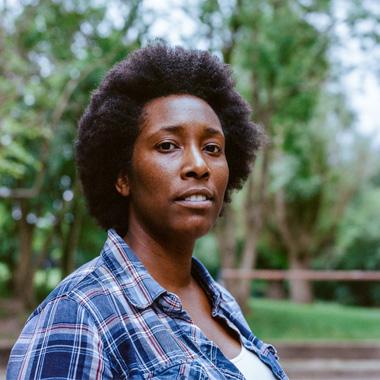Gail Babb
Staff details
Links
Gail Babb is an award-winning theatre maker who specialises in new work, participatory arts and experiments with form.
Gail is a lecturer in the department of Theatre & Performance and co-director of the MA Applied Theatre alongside Molly McPhee
Gail has collaborated with professional and community artists to create shows for theatres, outdoor spaces and found sites (including museums, swimming pools and a derelict school), as well as national and international touring.
Academic qualifications
- MA Applied Drama: Theatre in Educational, Community & Social Contexts, Goldsmiths University of London
- BA Hons. Drama, University of Hull
Teaching and supervision
As co-director of MA Applied Theatre, Gail convenes and teaches modules across the programme. She leads Reflexive Practitioner - a module run in collaboration with Talawa Theatre Company & Emergency Exit Arts, which sees students work with emerging artists to deliver workshops in community settings.
Gail also contributes to other programmes in Theatre & Performance as needed, such as MA Dramaturgy & Writing for Performance and BA Performance, Politics & Society.
Professional projects
Gail's practice centres and celebrates Black British experiences, experiments with form and is rooted in collaboration. As director and dramaturg, she has worked with Fuel, Royal Exchange Manchester, Brixton House, China Plate, National Youth Theatre, Soho Theatre, Coney, Tamasha and Hackney Showroom. Recent credits include, as director, STARS by Mojisola Adebayo (Tamasha/ICA - OFFIE's Best New Play 2024), BODIES by Ray Young (Unlimited/Southbank Centre) and as co-creator/dramaturg, The Body Remembers (Heather Agyepong/Fuel) and Run it Back (Talawa).
As a consultant and trainer, Gail delivers inclusive practice and anti-racist training for drama schools, universities and arts organisations. From 2011-2013 Gail worked with Brighton and Sussex NHS Trust to deliver Equality, Diversity and Inclusion training for nurses and midwives, a development programme for Black and Asian staff and facilitated equality action planning with the trust’s Executive Team.
Gail was Producer for Participation & Learning at Talawa Theatre Company from 2007-2018, where she brought work with communities and emerging artists to the centre of the company. Over her career, she has supported hundreds of young Black artists, technicians and producers as they have taken their first steps into the industry, 60% of whom are now sustaining creative careers.
Conferences and talks
2021:
What Shapes How We Shape Performance?
Kenneth Tynan Award Winner Keynote Spech
2018:
Equality Diversity & Inclusion: What's Stopping Us?
A paper written for The Clore Leadership Programme
2017:
'British theatre is hideously white'
Interview on BBC News in response to research from the Andrew Lloyd Webber Foundation
Awards & Fellowships
2021: Kenneth Tynan Award for Excellence in Dramaturgy
2021: Alfred Fagon Awards - 25 Black Champions of Theatre
2020: Black British Business Awards - Arts & Media Finalist
2017: Clore Leadership Programme - Fellowship
